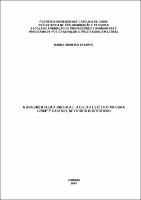| Compartilhamento |


|
Use este identificador para citar ou linkar para este item:
http://tede2.pucgoias.edu.br:8080/handle/tede/4171Registro completo de metadados
| Campo DC | Valor | Idioma |
|---|---|---|
| dc.creator | Tavares, Daniel Moreira | - |
| dc.creator.Lattes | http://lattes.cnpq.br/9684775151587760 | eng |
| dc.contributor.advisor1 | Rodrigues, Maria Aparecida | - |
| dc.contributor.advisor1Lattes | http://lattes.cnpq.br/2329167623085176 | eng |
| dc.contributor.referee1 | Faria, Edna Silva | - |
| dc.contributor.referee1Lattes | http://lattes.cnpq.br/3036225069737025 | eng |
| dc.contributor.referee2 | Teixeira, Átila Silva Arruda | - |
| dc.contributor.referee2Lattes | http://lattes.cnpq.br/4311689779309999 | eng |
| dc.date.accessioned | 2019-04-09T17:19:42Z | - |
| dc.date.issued | 2019-02-05 | - |
| dc.identifier.citation | Tavares, Daniel Moreira. A Argumentação Jurídica e o Efeito Estético na Obra Crime e Castigo, de Fiódor Dostoiévski. 2019. 89 f. Dissertação (Programa de Pós-Graduação STRICTO SENSU em Letras) - Pontifícia Universidade Católica de Goiás, Goiânia-GO. | eng |
| dc.identifier.uri | http://tede2.pucgoias.edu.br:8080/handle/tede/4171 | - |
| dc.description.resumo | A proposta desta pesquisa é analisar a argumentação jurídica e o efeito estético na obra Crime e Castigo, de Fiódor Dostoiévski. Para tanto, partimos da premissa comunicativa da obra literária e da capacidade desta fornecer elementos textuais passíveis de construírem uma linha de raciocínio argumentativo, responsável por conduzir o leitor a vivenciar determinadas experiências estéticas. A obra selecionada para o desenvolvimento do presente estudo se mostra de grande relevância, pelo fato de sua narrativa compor-se de elementos argumentativos no qual o personagem principal, Raskólnikov, se envolve na prática de um terrível assassinato e, por isso, procura por diversas maneiras justificar as suas atitudes. A conduta do protagonista descrita na obra Crime e Castigo possibilita uma dupla reflexão, tanto no aspecto jurídico quanto literário. E por essa razão adotamos a linha de pesquisa do direito na literatura para refletir os elementos argumentativos e o próprio conceito de crime discutido durante a narrativa. Todavia, além de demonstrar a íntima relação entre a literatura e o universo jurídico, o presente trabalho aborda a teoria do efeito estético desenvolvida por Wolfgang Iser, justamente para discutir a interação entre a obra, o leitor e o efeito produzido da íntima relação entre os elementos textuais e a capacidade imagética de cada receptor, para assim, evidenciar a riqueza do texto literário. | eng |
| dc.description.abstract | The proposal of this research is to analyze the legal argumentation and the aesthetic effect in the work Crime and Punishment of Fiódor Dostoiévski. For this we start from the communicative premise of the literary work and its capacity to provide textual elements capable of constructing a line of argumentative reasoning, responsible for leading the reader to experience certain aesthetic experiences. The work selected for the development of the present study is essential, because his narrative compose argumentative elements where the main character, Raskolnikov, engages in the practice of a terrible murder and therefore seeks in various ways to justify his attitudes. The conduct of the protagonist described in the work Crime and Punishment allows a double reflection, both in the legal and literary aspects. And so we adopted the right line of literature research to reflect the argumentative elements and the very concept of crime discussed during the narrative. However, in addition to demonstrating the close relationship between literature and the legal universe, the present work deals with the theory of aesthetic effect developed by Wolfgang Iser, precisely to discuss the interaction between the work and the reader and the effect produced by the intimate relationship between the textual elements and the imaginary capacity of each receiver, in order to highlight the richness existing in the literary text. | eng |
| dc.description.provenance | Submitted by admin tede ([email protected]) on 2019-04-09T17:19:42Z No. of bitstreams: 1 Daniel Moreira Tavares.pdf: 856908 bytes, checksum: dcbabecf3800fca4edaa1f56c2f41a52 (MD5) | eng |
| dc.description.provenance | Made available in DSpace on 2019-04-09T17:19:42Z (GMT). No. of bitstreams: 1 Daniel Moreira Tavares.pdf: 856908 bytes, checksum: dcbabecf3800fca4edaa1f56c2f41a52 (MD5) Previous issue date: 2019-02-05 | eng |
| dc.format | application/pdf | * |
| dc.thumbnail.url | http://tede2.pucgoias.edu.br:8080/retrieve/13101/Daniel%20Moreira%20Tavares.pdf.jpg | * |
| dc.language | por | eng |
| dc.publisher | Pontifícia Universidade Católica de Goiás | eng |
| dc.publisher.department | Escola de Formação de Professores e Humanidade::Curso de Letras | eng |
| dc.publisher.country | Brasil | eng |
| dc.publisher.initials | PUC Goiás | eng |
| dc.publisher.program | Programa de Pós-Graduação STRICTO SENSU em Letras | eng |
| dc.rights | Acesso Aberto | |
| dc.subject | Argumentação, Crime, Direito, Efeito, Leitor. | por |
| dc.subject | Argumentation, Aesthetics, Reader, Crime. Law. | eng |
| dc.subject.cnpq | LINGUISTICA, LETRAS E ARTES::LETRAS | eng |
| dc.title | A Argumentação Jurídica e o Efeito Estético na Obra Crime e Castigo, de Fiódor Dostoiévski | eng |
| dc.type | Dissertação | eng |
| Aparece nas coleções: | Mestrado em Letras | |
Arquivos associados a este item:
| Arquivo | Descrição | Tamanho | Formato | |
|---|---|---|---|---|
| Daniel Moreira Tavares.pdf | Texto Completo | 836,82 kB | Adobe PDF |  Baixar/Abrir Pré-Visualizar |
Os itens no repositório estão protegidos por copyright, com todos os direitos reservados, salvo quando é indicado o contrário.




